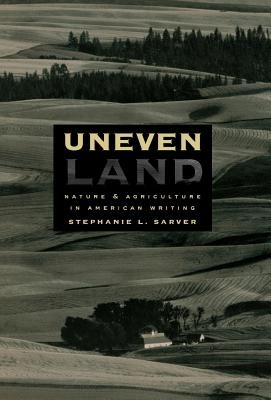
- We will send in 10–14 business days.
- Author: Stephanie Sarver
- Publisher: University of Nebraska Press
- ISBN-10: 0803242522
- ISBN-13: 9780803242524
- Format: 14.9 x 22.4 x 2.4 cm, hardcover
- Language: English
- SAVE -10% with code: EXTRA
Reviews
Description
Uneven Land explores the ambiguous conceptual position of agriculture and nature in American literature during the late nineteenth and early twentieth centuries. Focusing on the work of Ralph Waldo Emerson, Hamlin Garland, Frank Norris, William Ellsworth Smythe, and Liberty Hyde Bailey, Stephanie L. Sarver reveals a range of views about agriculture, its value to the individual, and its relationship to nature. Sarver proposes that agricultural practices require a relationship with nature that is simultaneously material and spiritual as well as economic and social. Emerson interprets the relationship between the farmer and nature in several ways, confirming that the farmer enjoys a privileged connection to nature. Garland and Bailey continue in Emerson's tradition but present the farmer's relationship to nature as always compromised by the commercial character of farming. In contrast, Norris and Smythe minimize the individual spiritual experiences of nature in farming. They abstract agrarian land, suggesting that the farm is a stage on which human dramas are enacted. Out of this study emerges a complex picture of America's uncertain relationship with nature and agriculture. Stephanie L. Sarver received her Ph.D. from the University of California, Davis. She works as an editor in the San Francisco Bay area. She has written for Western American Literature, Literature/Film Quarterly, and Terra Nova.
- Author: Stephanie Sarver
- Publisher: University of Nebraska Press
- ISBN-10: 0803242522
- ISBN-13: 9780803242524
- Format: 14.9 x 22.4 x 2.4 cm, hardcover
- Language: English English
Uneven Land explores the ambiguous conceptual position of agriculture and nature in American literature during the late nineteenth and early twentieth centuries. Focusing on the work of Ralph Waldo Emerson, Hamlin Garland, Frank Norris, William Ellsworth Smythe, and Liberty Hyde Bailey, Stephanie L. Sarver reveals a range of views about agriculture, its value to the individual, and its relationship to nature. Sarver proposes that agricultural practices require a relationship with nature that is simultaneously material and spiritual as well as economic and social. Emerson interprets the relationship between the farmer and nature in several ways, confirming that the farmer enjoys a privileged connection to nature. Garland and Bailey continue in Emerson's tradition but present the farmer's relationship to nature as always compromised by the commercial character of farming. In contrast, Norris and Smythe minimize the individual spiritual experiences of nature in farming. They abstract agrarian land, suggesting that the farm is a stage on which human dramas are enacted. Out of this study emerges a complex picture of America's uncertain relationship with nature and agriculture. Stephanie L. Sarver received her Ph.D. from the University of California, Davis. She works as an editor in the San Francisco Bay area. She has written for Western American Literature, Literature/Film Quarterly, and Terra Nova.


Reviews